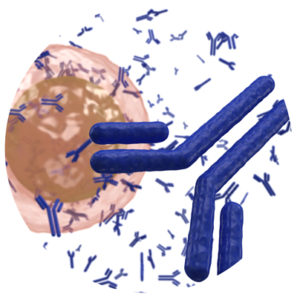
Antibody Development vs Antibody Production. The terms development and production are often used interchangeably in the antibody industry which has caused some degree of confusion. The mix-up is understandable, since one procedure is just an extension of the other one. Antibodies are developed, and then – if need – they are produced. All antibodies are developed by the host species and through additional procedures like hybridization or phage display. But antibodies are only being produced when a final product is being grown and isolated.
What Is Meant by "Antibody Development"?
Antibody development is the procedure of creating and characterizing an antibody. Development begins with injecting an antigen into a host animal. This allows the immune system to target it and develop a wide mixture of antibodies. From this point, development procedures change depending on the desired type of antibodies. For instance, polyclonal antibodies can be extracted from the serum, while mouse monoclonal antibodies require spleen cells for hybridoma development. Single domain antibodies require isolation of PBMCs. The antibody development process can take several weeks depending on how immunogenic the antigen is. As well as what particular host species is used, and the type of antibody being developed.
What Is Meant by Antibody Production?
Antibody production is the process of creating a system in which large amounts of the previously developed antibodies can be created. Production procedures also change between antibody types.
Polyclonal antibody production is only limited by the amount of serum available because they are isolated direct from serum through a column. This is why we advise that if a large amount of polyclonal antibody is needed, a large animal such as a goat, sheep or llama should be used.
Monoclonal antibody production can be performed either in vitro or in vivo. In vitro production is done by growing already developed hybridomas in culture facilitating secretion of antibodies, while in vivo production through ascites involves injecting the developed hybridomas into a mouse’s peritoneum, providing the hybridoma with additional nutrients allowing for faster proliferation and greater volumes of antibody production at a faster pace.
Single domain antibody production can vary greatly across the industry; at this time ProSci uses phage display to express sdAbs in E. coli. The bacteria are grown in culture, and supernatant containing antibodies is collected.
Why Do Developed Antibodies Need Further Production?
Antibody development is done primarily in the host animal and through additional procedures in the lab. The most important step is finding the desired antibodies the host has developed and separating them from the rest of the protein in sera. Our development process has the goal of making sure the best antibody for your target is isolated from the host immune system using techniques like plasma cell cloning or phage display to find that single type of antibody. Each further development step requires more time and effort. But at the end of it you will have the ability to produce the antibody of interest in large amounts, whether it is from an isolated plasmid or an immortal cell line.

